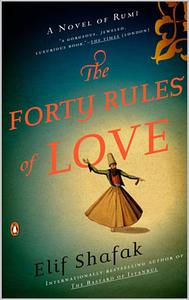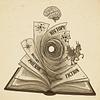Take a photo of a barcode or cover
2.26k reviews for:
قواعد العشق الأربعون: The Forty Rules of Love
جلال الدين الرومي, Elif Shafak, خالد الجبيلي
2.26k reviews for:
قواعد العشق الأربعون: The Forty Rules of Love
جلال الدين الرومي, Elif Shafak, خالد الجبيلي
emotional
medium-paced
I read my first Elif Shafak novel in 2020 and since then, I’ve been on a mission to collect (and read) all her books because I guess, I want to double-check that she is my favourite author before actually announcing it to the world. I was recommended ‘The Forty Rules of Love’ by my work colleague, who after reading ‘The Island of Missing Trees’ from my recommendation, suggested I read this book so we can both ‘stan’ over Elif and her writing.
SYNOPSIS: Ella Rubenstein is forty years old and unhappily married when she takes a job as a reader for a literary agent. Her first assignment is to read and report on ‘Sweet Blasphemy’, a novel written by a man named Aziz Zahara. Ella is mesmerised by his tale of Shams's search for Rumi and the dervish's role in transforming the successful but unhappy cleric into a committed mystic, passionate poet, and advocate of love. She is also taken with Shams's lessons, or rules, that offer insight into an ancient philosophy based on the unity of all people and religions, and the presence of love in each and every one of us. As she reads on, she realises that Rumi's story mirrors her own and that Zahara—like Shams—has come to set her free.
REVIEW: I went into this book not actually knowing what the story was about and was actually surprised when I found out that it was two books for the price of one - just the first reason why Elif is such a unique talent. So alongside Ella’s story about her unhappy marriage and realisation that she wants more, we also get the story of ‘Sweet Blasphemy’ - the book that Ella is reading for her new job as a literary agent. It’s through ‘Sweet Blasphemy’ that Ella comes to know the author, Aziz Zahara, and the different stories run together as one.
So as there are two books running parallel to each other, there are a lot of different characters but in true Elif Shafak style, every character was so vivid and clear in my mind when I was reading their narrative and I never felt like I was confused at any point as to who was who. The main characters in the ‘Sweet Blasphemy’ story were Sufi and Rumi. However, in my opinion, I wasn’t that interested in their narrative. In fact, I was more hooked on all the other narratives from the other characters who all had a motive for disliking Sufi and as we know that Sufi gets killed right at the start of the book, I liked seeing the different personal vendettas behind his death and working out who played a part in his murder.
Obviously because the name of the book is The Forty Rules of Love, the theme of love runs throughout the novel and each rule pops up here and there in the Sweet Blasphemy story, when Sufi uses different rules to help the other characters make sense of how they are feeling. I really enjoyed seeing how Elif incorporated these rules into the story and how these rules influenced Ella into changing her belief on love and her relationship. I also loved the added little details (like every chapter in Sweet Blasphemy beginning with ‘B’) that in true Elif style made the book a joy to read. However, although I enjoyed the story, I can’t say I was completely invested? I did struggle to write this review and actually remember what happened, which screams to me that this book was good but not ‘wow’. I still enjoyed the story though and I would still recommend this read to anyone looking to extend their Elif Shafak collection and a book with short chapters!
READ THIS IF:
SYNOPSIS: Ella Rubenstein is forty years old and unhappily married when she takes a job as a reader for a literary agent. Her first assignment is to read and report on ‘Sweet Blasphemy’, a novel written by a man named Aziz Zahara. Ella is mesmerised by his tale of Shams's search for Rumi and the dervish's role in transforming the successful but unhappy cleric into a committed mystic, passionate poet, and advocate of love. She is also taken with Shams's lessons, or rules, that offer insight into an ancient philosophy based on the unity of all people and religions, and the presence of love in each and every one of us. As she reads on, she realises that Rumi's story mirrors her own and that Zahara—like Shams—has come to set her free.
REVIEW: I went into this book not actually knowing what the story was about and was actually surprised when I found out that it was two books for the price of one - just the first reason why Elif is such a unique talent. So alongside Ella’s story about her unhappy marriage and realisation that she wants more, we also get the story of ‘Sweet Blasphemy’ - the book that Ella is reading for her new job as a literary agent. It’s through ‘Sweet Blasphemy’ that Ella comes to know the author, Aziz Zahara, and the different stories run together as one.
So as there are two books running parallel to each other, there are a lot of different characters but in true Elif Shafak style, every character was so vivid and clear in my mind when I was reading their narrative and I never felt like I was confused at any point as to who was who. The main characters in the ‘Sweet Blasphemy’ story were Sufi and Rumi. However, in my opinion, I wasn’t that interested in their narrative. In fact, I was more hooked on all the other narratives from the other characters who all had a motive for disliking Sufi and as we know that Sufi gets killed right at the start of the book, I liked seeing the different personal vendettas behind his death and working out who played a part in his murder.
Obviously because the name of the book is The Forty Rules of Love, the theme of love runs throughout the novel and each rule pops up here and there in the Sweet Blasphemy story, when Sufi uses different rules to help the other characters make sense of how they are feeling. I really enjoyed seeing how Elif incorporated these rules into the story and how these rules influenced Ella into changing her belief on love and her relationship. I also loved the added little details (like every chapter in Sweet Blasphemy beginning with ‘B’) that in true Elif style made the book a joy to read. However, although I enjoyed the story, I can’t say I was completely invested? I did struggle to write this review and actually remember what happened, which screams to me that this book was good but not ‘wow’. I still enjoyed the story though and I would still recommend this read to anyone looking to extend their Elif Shafak collection and a book with short chapters!
READ THIS IF:
I read half the book in 2017 and then reread the whole thing several years later. The first time I read the first half I loved it, maybe having a low bar for books that touch on Sufism and just happy that something exists that includes Shams Tabriz & Rumi. However in reading it again, I didn’t like it as much as this author’s other books and as much as I did the first time. It moreso reinforced Sufi stereotypes (overusing the term mystic) and didn’t talk about the state of the heart as much as I would’ve hoped. The 40 rules themselves are beautiful. The Boston character was annoying, almost tokenizing and othering this “exotic” culture in her amazement of it.
emotional
inspiring
reflective
medium-paced
Plot or Character Driven:
Character
Strong character development:
Yes
Loveable characters:
Yes
challenging
emotional
hopeful
inspiring
slow-paced
Plot or Character Driven:
Character
Strong character development:
Yes
Loveable characters:
Complicated
Diverse cast of characters:
Yes
Flaws of characters a main focus:
Yes
I’m conflicted on this one. I did like it. Yet sometimes I was so confused reading it. It’s a complicated book. The writing is very poetic and beautiful and the characters and story line is complex. I feel like I might have to read it a second time to understand it wholly. Although I will say this. I was left almost melancholic after finishing it. Hence why I’m uncertain about picking it up again.
emotional
lighthearted
relaxing
sad
medium-paced
Plot or Character Driven:
Character
Strong character development:
Yes
Loveable characters:
Yes
Diverse cast of characters:
Yes
Flaws of characters a main focus:
No
This book will always stay close to my heart.
Too spiritual. Obvious teachings from any religion touted again and again.
emotional
reflective
medium-paced
Plot or Character Driven:
A mix
Strong character development:
Yes
Loveable characters:
Yes
Diverse cast of characters:
Yes
Flaws of characters a main focus:
Complicated
3.5 stars. I feel a lot about this book yet I cannot seem to put any those feelings into words. It leaves me in a confusing state on how to review it. But maybe that makes it the review..? I liked that is was written from the perspective of a lot of different people all who get in touch with Shams at some point, yet I found them almost all really annoying, but still I enjoyed reading it and the story a lot. It does give you a different view on love and religion and being a nomad.




